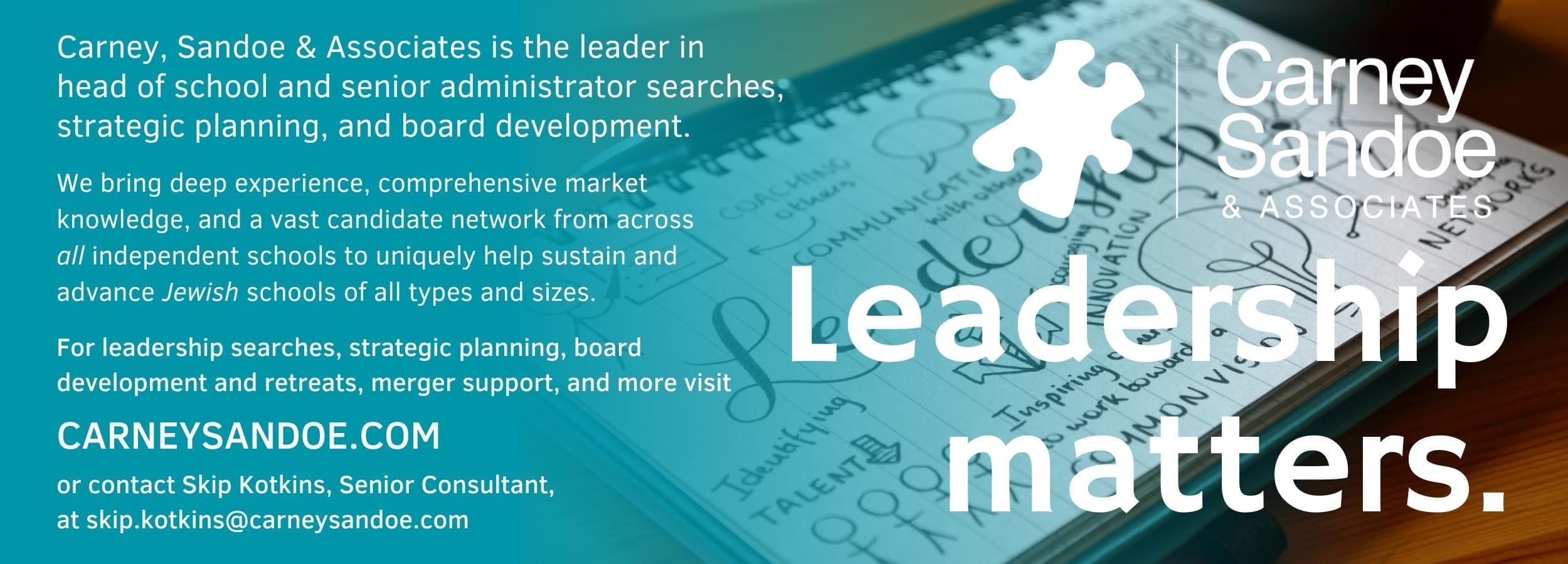The Role of Appreciation in Teacher Retention

Tamar Appel. is the Director of Education at Hidden Sparks. She also serves as a Mentor for rising school leaders in Prizmah’s YOULead program. Previously, she served as the Associate Principal of Ma’ayanot Yeshiva High School for Girls for 12 years.
Teachers are often driven by idealism. The meaningful and impactful work of educating youth can be truly gratifying. This personal sense of fulfillment, however, is not always enough to keep teachers in the field, or at their particular workplaces, when the work may be satisfying but also draining and seemingly limitless. As with any other profession that is mission-oriented, it would be highly misguided to conflate the desire to “do good” with an impulse toward selfless voluntarism; we should not expect teachers to embrace the nobility of their commitments without enjoying explicit appreciation for their accomplishments.
What does it look like for a teacher to feel appreciated? Based on my observations as an administrator and a mentor for teacher-leaders across different schools, people do not always mean the same thing when they express wanting appreciation, so the answer to this question can feel elusive even to the most well-intentioned school leader. Since expressing such appreciation can be closely linked to retaining teachers, I believe it is worth considering approaches that administrators can adopt and adapt to convey that sentiment clearly. I focus here on four that have had particular significance in my own experience supervising and coaching teachers.
Compensation
There is much to say about teacher compensation in Jewish day schools—including relatively low salary scales as well as gender disparities in pay that continue to exist in many schools—all of which are beyond the scope of this article. Beyond that, there are elements of compensation that can be isolated from the general issue of salary and which serve as a vehicle for expressing appreciation for a teacher’s time and professional stature. Teachers should be compensated appropriately for the work they do that goes beyond the specific parameters of their contracts.
I am not referring here to rotational assignments such as lunch duty or class coverage that are ancillary to teaching but contribute to the operational needs of a school, but to those roles teachers take on which affect the very substance of the educational encounter and experience, in or outside the classroom. Whether teachers prepare curricula to be used by others, advise or coach teams, or take on other initiatives and leadership roles, school leaders demonstrate that they value teachers’ time by paying them.
I recall a newly minted department chair who offered to create a new curriculum for her school to use and share with other teachers within her discipline. This would have taken most of a summer to research and compose, as well as the following school year to pilot and modify. She was excited to immerse herself in this initiative and encouraged by her principal’s enthusiasm until she discovered that there was no intention to compensate her for this huge undertaking. The principal explicitly hoped that this project could be subsumed within her role as chair, whereas the chairperson knew from precedent within the school that the parameters of that role did not include the heavy lifting involved in crafting a rich curriculum that would enhance the offerings of the department. While she was motivated to take on the venture, she refused to do this in a volunteer capacity and was disheartened by the lack of compensation, almost stepping away from the enterprise until her supervisor agreed to pay her.
Paying teachers for the work they do beyond their classroom responsibilities—including advising, curriculum design, special programs, and supervising tefilla—is the most direct and explicit form of appreciation. Small gifts, however well-intended, are valuable supplements to compensation, but do not suffice as replacements.
Opportunities for Professional Advancement
School leaders can provide rich and varied opportunities for teachers to grow professionally and contribute beyond the walls of their classrooms. Offering those opportunities is an indication that the teacher’s talents are valued. The most obvious form this takes is tapping internal candidates for open positions within the school: chairing departments, advising clubs, coaching teams, serving as grade deans, and so on. Indeed, there are countless other prospects for noticing the unique skills teachers possess and enabling them to make their mark on the school.
A seasoned teacher who has been consistently helpful to new faculty can be asked to help with orientation for new teachers or to help them acclimate throughout the year in a more formalized way. An educator who is accomplished in fostering the growth of students in remedial classes can be offered the chance to support teachers of similar classes, or to work with the learning center; similarly, one who has been successful in challenging students with higher-level competencies can be invited to design enrichment opportunities across several grades. A teacher with strong organizational and technical skills can be selected to assist with needs relating to the facilities and scheduling. For schools with rich student-activities offerings, it can be invaluable to have a teacher with expertise in experiential education take the lead on shabbatonim and other co-curricular programs. Developing teacher-leaders through training and mentorship in pedagogical methods that they can then impart to the faculty is a powerful mechanism for appreciating their strengths.
Not everyone wants such advancement, but offering it is nonetheless an honor and a salient expression of acknowledgment. Conversely, its absence can be demoralizing, especially when a teacher feels left out of advancement opportunities in contrast with colleagues. Several times in recent years, I heard from teachers in a variety of Jewish day schools who considered leaving or left for other teaching jobs because they were given mixed messages about their options for advancement or because they had witnessed the progression of others in their departments with no such opportunity offered to them. Not everyone is fit for significant advancement, but over a series of years, recognizing the distinctive capacities of individual teachers transmits a clear message to the entire faculty, even when the resulting assignment is not on a large scale. That message is not only one of appreciation, but critically, one of trust. The school’s desire to grow the talents of its faculty from within generates a sense of rootedness, loyalty, and mutual commitment.
Emotional Support
In the past several years, increasing numbers of Jewish day schools have embraced the importance of attending to the psychological needs of students inside the school building. Teachers are most often on the front lines in this context: they keep tabs on social dynamics, changes in affect and mood, fatigue, and many other markers of health and decline. Given the increasing complexity of teachers’ responsibilities, schools would do well to devote resources toward supporting their psychological needs. On the most basic level, a school can demonstrate respect for teachers’ time. This can include designing schedules to incorporate free periods that are truly free (i.e., that they will not be asked to give up for school purposes) and setting limits on the times of day when students and parents can expect the teachers to be available.
Further in the progression of support is to actually provide teachers with access to a psychologist or social worker for their own needs. This does not necessarily mean hiring someone exclusively for that purpose. Perhaps a better option is to allocate time to faculty from a member of the guidance staff who continues to be “on the ground” in supporting students’ emotional lives. When we identified a member of our guidance team who was well suited for this role, the benefits to the faculty were palpable. Her office was a safe space for navigating professional and personal challenges, and through those meetings as well as workshops about topics such as emotional regulation and empathy, she increased our self-efficacy about our capacity to support both our students and ourselves.
A decision to support faculty this way conveys the powerful message that the school administration, which sets expectations and hopefully offers teachers feedback about their performance, believes these caregivers’ psychological wellbeing is as important as those of their students. This is appreciation in the form of compassion and psychological safety.
Being Visible
While monetary compensation is concrete, being visible to supervisors can transform the work experience. Being visible means being observed and acknowledged for one’s talents and wisdom. It means that administrators visit teachers’ classrooms on a regular basis to witness their pedagogy, watch the students learn, and follow up soon after with constructive feedback. It means that instructional leaders and heads of schools make a habit of visiting teachers’ work rooms and gathering spaces to talk with them and show interest in their areas of focus. It means that school leaders are in ongoing dialogue with advisers and coaches, and not only when their teams are struggling or win trophies. It means that the school leadership celebrates individual faculty members’ accomplishments, whether by announcing a teacher’s publication to the broader community or by posting on Instagram about a unique classroom experience. It means that the leadership seeks teachers’ input about school policies, decisions, potential initiatives, and vision.
These classroom visits and conversations, which are essential in building relationships and trust, need not be long. They only need to be substantive and egalitarian: all teachers deserve to be seen, to hear praise from their supervisors, to receive prompt and constructive feedback that is direct and supportive, and to be included in conversations where school culture or initiatives are under consideration.
I am confident that the importance of administrative classroom visits is no revelation to most school leaders in the Jewish day school world, and yet, when I have asked teachers across different institutions about their experiences being observed by members of their school administrations, most have expressed disappointment, even cynicism, because it seldom happens on the level they hope for. In school cultures that do not normalize regular administrative classroom observations, the environment is further harmed because teachers come to view such observations as alarming, and threatening, and hence feel uncomfortable requesting them. Teachers deserve to have their pedagogy on full display, to be seen in action on a regular basis, to be engaged in conversations about their choices and challenges, to have their opinions sought, and thereby to feel truly known and appreciated.
Conclusion
Whether the Great Resignation began with Covid or, as employment experts have suggested, it was already trending for years before the pandemic began, we know that teachers are among its protagonists. It has always been in the interest of Jewish day schools to hold onto their valued teachers; the stakes of not conveying appreciation are considerably higher now.
There are, in fact, many ways for school leaders to demonstrate their appreciation of individual teachers and their faculty as a whole. I targeted these examples in part because I have seen their benefits in retaining teachers—and how schools risk losing esteemed faculty in their absence. Moreover, investing time, energy, and resources in these areas yields benefits for the teacher-school relationship that extend beyond appreciation. It has great potential to foster a sense of belonging, investment, and loyalty to a school—and to the field of Jewish education, which relies on teachers who are outstanding and treasured.



Tamar Appel is the Director of Education at Hidden Sparks. She also serves as a mentor for rising school leaders in Prizmah’s YOULead program. Previously, she served as the Associate Principal of Ma’ayanot Yeshiva High School for Girls for 12 years.
Reach 10,000 Jewish educational professionals. Advertise in the upcoming issue of Jewish Educational Leadership.






Thank you for this very important article about compensating teachers fairly for their time, dedication, and talen.